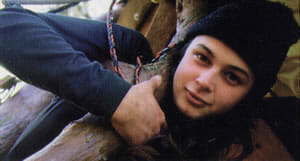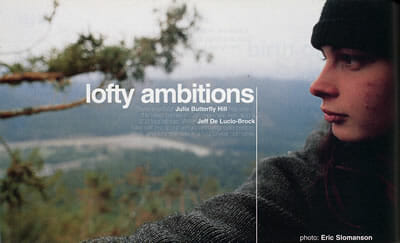FIFTEEN STORIES UP in the air, 25-year-old Julia Butterfly Hill is connecting with a living thing that is 1,000 years old. Amid the branches of the 200-foot-tall tree Luna – the largest remaining redwood on a steep slope that’s been clear-cut by loggers – Hill is intimately familiar with the feel of the bark, the design of the needles, and the scars from centuries of fires and lightning strikes. Now Luna owes its life to her and a small group of determined activists.
Hill and Luna keep each other thriving. “I lay nestled in Her arms,” Hill writes in her poem “Moments of Hope.” “I listen to all She has to say/She speaks to me through my bare feet… my hands/She speaks to me on the/wind… and in the rain/telling me stories born long/before my time.”
December 10, 1998 marked one year that Hill has spent in Luna, the longest tree occupation in American history. She has vowed not to set foot on the ground until she has done everything in her power to save the tree, located on California’s north coast near Eureka in the Headwaters Forest, the world’s last remaining unprotected grove of ancient redwood trees.
Her regal, lyrical voice easily reels off nature-colored metaphors. As she cycles from cosmic generalities about her spiritual connection with Luna to the hard specifics of logging industry politics, she always returns to the concept of unconditional love for all life. Incredibly, she even loves the CEO of the company that is logging the area. “Creation didn’t mess up – those are beautiful people,” she says, bemoaning society’s loss of connection. “When you sever a plant from its roots, what happens is that it turns brown and dies.”
Hill, who has become a worldwide symbol of environmental activism, chose the name Butterfly because one landed on her at age seven, during a family hike, and stayed on her for hours. She spent most of her youth moving from one campground to another in a car trailer with her mother and traveling preacher father, who home-schooled her and encouraged her to be self-sufficient.
For Hill, who dropped out of college after two years and owned a restaurant/club with her father once he left the ministry, a 1996 car accident changed her life. Her steering wheel got lodged into the cavity of her skull, impairing her memory and speech for ten months. Being almost left in a state where she could never live “in the moment” again made her realize that “every moment is a gift.”
 So she embarked on a pilgrimage to the ancient redwoods along California’s Lost Coast. “I got far enough from the highway and got the fumes out of my nostrils and sounds out of my ears,” she says. “I sunk my face into the dust and my fingers into the soil. I remembered what humans have forgotten – life with a capital L. We were not created to be part of a paycheck society but to be a part of life.”
So she embarked on a pilgrimage to the ancient redwoods along California’s Lost Coast. “I got far enough from the highway and got the fumes out of my nostrils and sounds out of my ears,” she says. “I sunk my face into the dust and my fingers into the soil. I remembered what humans have forgotten – life with a capital L. We were not created to be part of a paycheck society but to be a part of life.”
She found out about the ongoing destruction of the forest, and after intense prayer she sold everything she owned, except for a tent, sleeping bag, and changes of clothes. Then she joined the Luna tree sit-in started not long earlier by Earth First.
For the untrained, the ascent takes 20 minutes to two hours. When Hill reached 75 feet on her first climb, she began to panic. “I closed my eyes, put my forehead and hands on her trunk, and projected my energy through to her roots ” she says. “It was an instantaneously grounding experience.” Now she can climb to the highest branch without gear.
Enclosed in a 6-by-8 foot dome of multicolored tarps, Hill uses a bucket for a toilet, candles for lights, a one-burner propane stove and a radio powered by turning a crank. She is supported by a ground crew that stuffs water and food (mostly salads and fruits) into a sack which Hill pulls up with a haul line.
She does two to four media interviews a day. Radio shock jocks have told her that if she climbed a tree in their backyard, they’d shoot her out. But she reminds them that mudslides caused by clear-cutting on slopes have destroyed seven homes in nearby Stafford. “I tell them, ‘If I climbed a tree in your backyard to protect your house from a mudslide, would that make you think differently?’ They change the subject every time.”
When she’s not spreading the word through the press, she talks with community groups on her cell phone, and pens letters for as long as the light allows. She compares her perception of time to a river she sees from her perch: “Some days it’s very slow and meandering, the next it’s washing past headfirst. It’s a continuous motion that’s not separated by sunrises and sunsets.”
Mice, flying squirrels, hummingbirds, and red tail hawks all visit her. But the views and sounds aren’t all idyllic. Highway 101 lies below her, surrounded by clear-cut stumps the size of small cars, and whistle-blows and logging equipment noises blast from the Pacific Lumber Company headquarters three miles away.
 Under a recently filed Habitat Conservation Plan, which Hill calls a weak political compromise, Charles Hurwitz’s Maxxam Corporation, owner of Pacific Lumber and Headwaters, proposes to harvest almost half its remaining ancient trees while continuing to operate on unstable slopes such as the one where Luna exists. Instead Hill urges a “conservation easement” that would pay the company to protect the old growth and stop logging on steep slopes while still allowing it to harvest timber and extract a profit.
Under a recently filed Habitat Conservation Plan, which Hill calls a weak political compromise, Charles Hurwitz’s Maxxam Corporation, owner of Pacific Lumber and Headwaters, proposes to harvest almost half its remaining ancient trees while continuing to operate on unstable slopes such as the one where Luna exists. Instead Hill urges a “conservation easement” that would pay the company to protect the old growth and stop logging on steep slopes while still allowing it to harvest timber and extract a profit.
Hill says she’s survived Pacific Lumber’s 10-day supply blockade, flood lights, helicopter intimidation, and all-night air horns. But she doesn’t want to be spun into a fluffy human-interest story, an “overcoming hardships” case. What she’s learned is the power of love to transform things – “the butterfly breaking free of the cocoon.” Her advice to urban dwellers: make the “alternative” the norm. Re-use envelopes. Buy hemp, one acre of which is equivalent to one acre of 20-year-old trees. Boycott Home Depot, the world’s largest retailer of old-growth wood.
“Before you turn on the stove, open the refrigerator, get in the car, or throw something away,” she says from the tip of her millennium-aged friend, “consider the legacy that action will leave.”
Julia’s website, The Circle of Life Foundation, is www.circleoflife.org.


